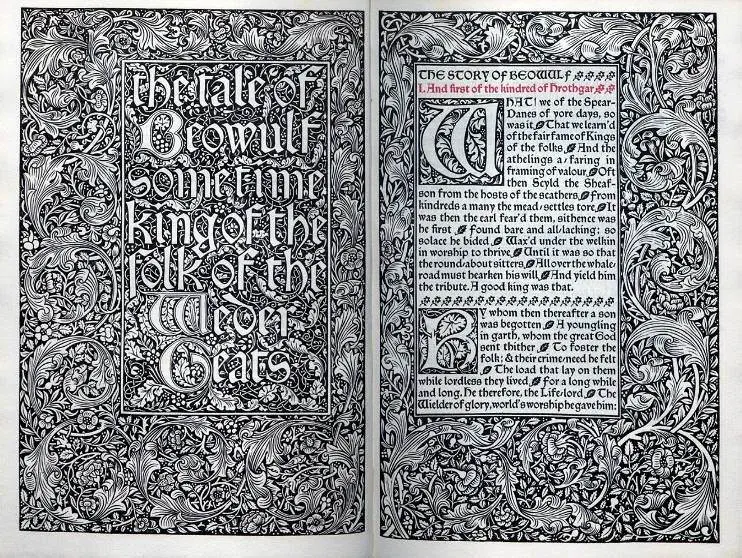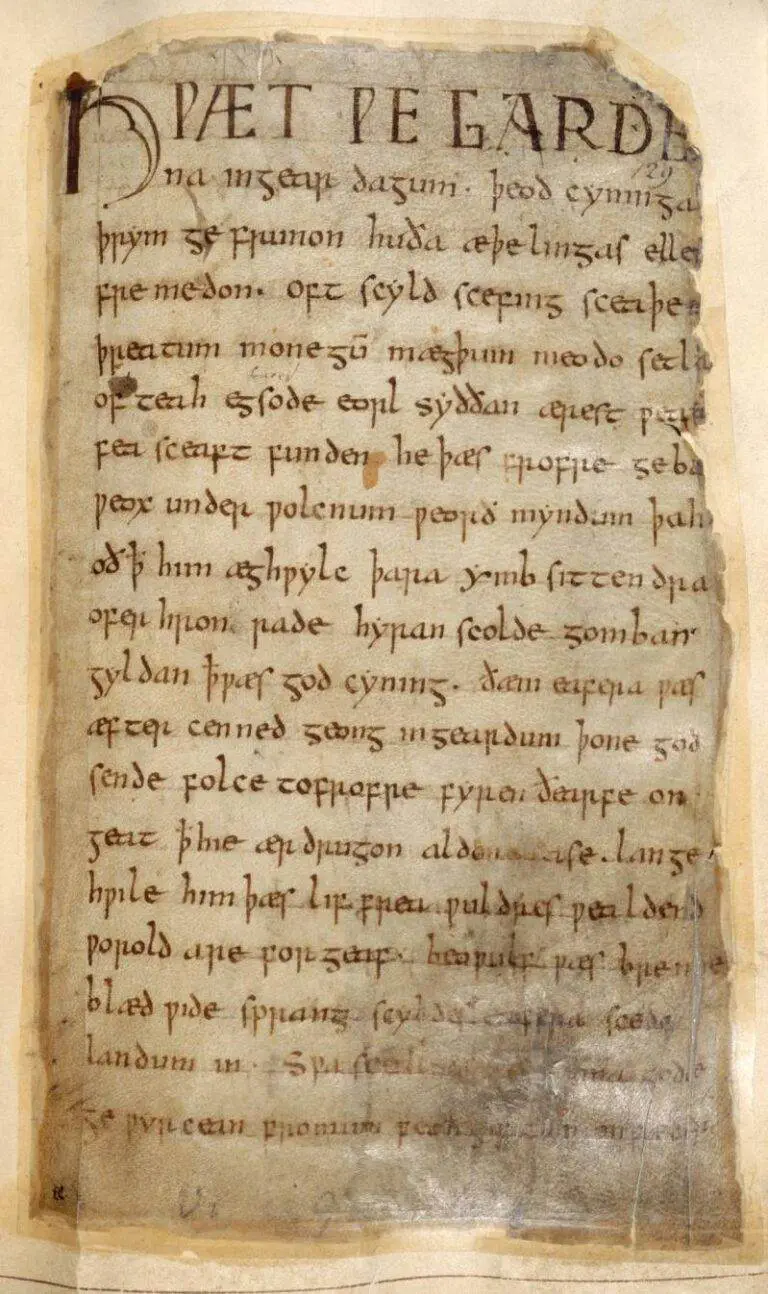Old English literature encompasses literature written in Anglo-Saxon England from the 7th century to the decades after the Norman Conquest of 1066. Old English was the language spoken by the Anglo-Saxons, who came to Britain from parts of what is now Germany, Denmark and the Netherlands in the 5th century. The language had its roots in Germanic languages like Old Saxon and Old Frisian [1].
Table of Contents
Old English literature emerged from an oral tradition of poetry and storytelling. It was heavily influenced by Anglo-Saxon pagan beliefs and the introduction of Christianity in the 7th century [2]. Major characteristics of Old English literature include alliterative verse, kennings, and epic poetry focusing on heroes and adventures.
Introduction to Old English Literature
Though Old English died out as a spoken language after 1066, Old English literature remains an important part of English literary history. It provides insight into the early medieval period in England and the origins of English language and culture. Well-known Old English works include the epic poem Beowulf, The Wanderer, The Seafarer, and the Anglo-Saxon Chronicle. Elements of Old English continue to influence modern English today.
Poetry
Old English poetry consists of two major genres – heroic poetry and elegies. The most famous heroic poem is Beowulf, an epic that follows the adventures of the great Scandinavian warrior Beowulf as he battles supernatural monsters. Other noteworthy heroic poems include “The Battle of Maldon” and “The Fight at Finnsburh.” Heroic poetry often deals with themes of courage, loyalty, reputation, and the Germanic heroic code. These poems frequently employ literary devices like kennings, alliteration, and caesura.

Elegies are lyric poems that mourn the loss of life. Well-known Old English elegies include “The Wanderer,” “The Seafarer,” and “The Wife’s Lament.”Several others have similar themes, and three elegies—“The Husband’s Message,” “The Wife’s Lament,” and “Wulf and Eadwacer”—describe what appears to be a love triangle. Elegies contemplate melancholy topics like isolation, hardship, and the passage of time.
Other genres of Old English poetry include riddles, gnomic verses, and religious poems. As Christianity took hold in England, more poems began incorporating Christian themes and influences. Over time, the poetry became more sophisticated with the increasing use of literary techniques. By the end of the Old English period in the 12th century, poetry had evolved significantly from the earlier works in terms of structure, language, and style.
Prose
Old English prose primarily consisted of homilies, translations from Latin, and histories [1]. Homilies were sermons written in English instead of Latin, aimed at educating a largely illiterate population on Christianity. Well-known examples of Old English prose include the Anglo-Saxon Chronicle, a record of important events in Anglo-Saxon history, and the writings of Aelfric and Wulfstan [2].
Prose works frequently contained strong religious themes, as the church played an integral role in Anglo-Saxon society and literacy [3]. However, secular themes were also present, such as in historical accounts of battles and kings in the Anglo-Saxon Chronicle.
The prose style was typically straightforward and utilitarian, aimed at conveying information and moral lessons rather than aesthetic beauty. Nevertheless, Old English prose laid the foundations for vernacular English literature and helped spread concepts like nationalism and historiography in England.
Epic and Heroic Poetry
The Old English epic poem Beowulf is one of the most famous works from this period. Set in Scandinavia, the poem tells the story of the hero Beowulf and his battles against three antagonists: Grendel, Grendel’s mother, and a dragon. Beowulf exemplifies the ideals of heroism and warrior culture valued in Anglo-Saxon society.[^1]
[^1]: Role Of Monsters In Beowulf – 799 Words
Beowulf is a Geatish hero who comes to the aid of Hrothgar, King of the Danes, by defeating the monster Grendel who has been terrorizing Hrothgar’s mead hall Heorot. In a deadly battle, Beowulf rips off Grendel’s arm and the monster flees back to the swamps where he dies. However, Grendel’s mother seeks revenge and attacks Heorot again. Beowulf pursues her back to her underwater lair where he slays her with a giant sword.[^2]
[^2]: The Importance of Monsters
After returning home and eventually becoming king of the Geats, Beowulf faces a final challenge late in life when a thief disturbs a dragon’s hoard of treasure and angers the beast. Beowulf battles the raging dragon but is mortally wounded. Though he defeats the dragon, he dies from his injuries. Throughout the battles, Beowulf demonstrates the key traits of an Anglo-Saxon warrior and nobility through his strength, courage, and loyalty to his kinsmen.[^3]
[^3]: THE USE OF MONSTERS IN BEOWULF
The monsters in the poem function as enemies representing vice, evil, and physical or spiritual threats that the hero must overcome. On a symbolic level, Grendel, his mother, and the dragon embody the flaws and dangerous impulses existing within human nature. Defeating these monsters represents overcoming evil desires and destructive forces at work in society.[^1]
Christian Influences
Christianity had a major influence on Old English literature. The Christianization of England began in the 6th century and was largely complete by the 8th century. This led to the translation of scriptural passages into Old English, most notably Caedmon’s Paraphrase which paraphrases biblical narratives in alliterative verse.
Religious poetry flourished as Christian poets like Caedmon and Cynewulf composed poems on biblical and hagiographical themes. Epic poems were also Christianized, such as the biblical parachronic in Genesis A and Christ in Exodus. The Benedictine Reform of the late 10th century revitalized religious life and learning in England.
This led to a blossoming of literary output from monks and nuns in newly founded monasteries and convents. Christian literature acted as a vehicle for moral and religious instruction to newly converted Anglo-Saxons. Works sought to inspire piety, warn against vice, and assure salvation. The spread of Christianity throughout England shaped Old English literature profoundly, infusing it with biblical narratives and Christian themes.
Language and Linguistics
Old English, also known as Anglo-Saxon, is the earliest form of English. It was spoken in England and parts of southern Scotland between the 5th and 11th centuries [1]. The language of this period is described as Proto-English or pre-English as it represents an early form of English [2].
Some key features of Old English grammar and vocabulary:
- Complex inflectional system with four cases for nouns, adjectives, and determiners [3]. This was significantly reduced in Middle English.
- Rich verbal morphology for verbs with specific conjugations [3].
- High degree of synthesis – words could be combined to form compounds and derivatives [2].
- Heavy borrowing from Latin, as well as Scandinavian influence from Viking settlers [1].
Some well-known Old English texts examples include Beowulf, an epic poem, the poem Caedmon’s Hymn, and prose writings in the Anglo-Saxon Chronicle [2]. These provide insight into Old English vocabulary, grammar and phonology.
Over the 11th to 15th centuries, Old English evolved into Middle English, which saw reduction of inflections, increased use of periphrastic constructions, and heavy borrowing from French [2]. This marked the transition to a form more closely resembling modern English.
Literacy and Manuscripts
Literacy was limited during the Old English period. According to The British and Reading: a short history, in the late 1400s only 10% of men were literate. The Growth of Literacy from 1100 to 1500 states that literacy grew slowly, with 30% literacy by 1650.

Most literature was transmitted orally by scops, or poets, who memorized and recited the poems. Manuscripts were handwritten by scribes in monasteries. Important manuscripts were illuminated with decorated initials and illustrations.
Only four major poetic manuscripts have survived from the Old English period – the Vercelli Book, Exeter Book, Beowulf Manuscript, and the Junius Manuscript. These manuscripts provide nearly all the extant poetry from this era, offering invaluable insight into Old English language, literature and culture. The Exeter Book is the largest known collection, containing 131 poems including elegies, riddles and religious verses.
Legacy
The literature of the Anglo-Saxons has had a profound and lasting influence on English language and literature. Many common words and language patterns used today can be traced back to Old English. The epic poem Beowulf, believed to be composed between the 8th and 11th centuries, continues to be widely read and studied today. As Dr. R.D. Bjork notes, “The influence of ‘Beowulf’, then, is vast and continuing and dynamic, its reception history constantly evolving” (source).
The study of Old English manuscripts and texts is an important area of scholarship that sheds light on the origins of English literature. Academics continue to study the language and stories of the Anglo-Saxons to better understand the evolution of the English literary tradition. The literature also provides insights into the culture, values, and worldview of the early medieval period in England. As one modern scholar writes, “Overall, the literature of the ancient Anglo-Saxons continues to have a strong influence on modern English literature and remains an important foundation of the English literary canon” (source).



2 Comments
Pingback: The Role of Fate in Thomas Hardy's 'Tess of the d'Urbervilles' - LitGram by MukeshRishit
Pingback: Your Go-To Collective Nouns List: Fun Facts and Friendly Definitions!